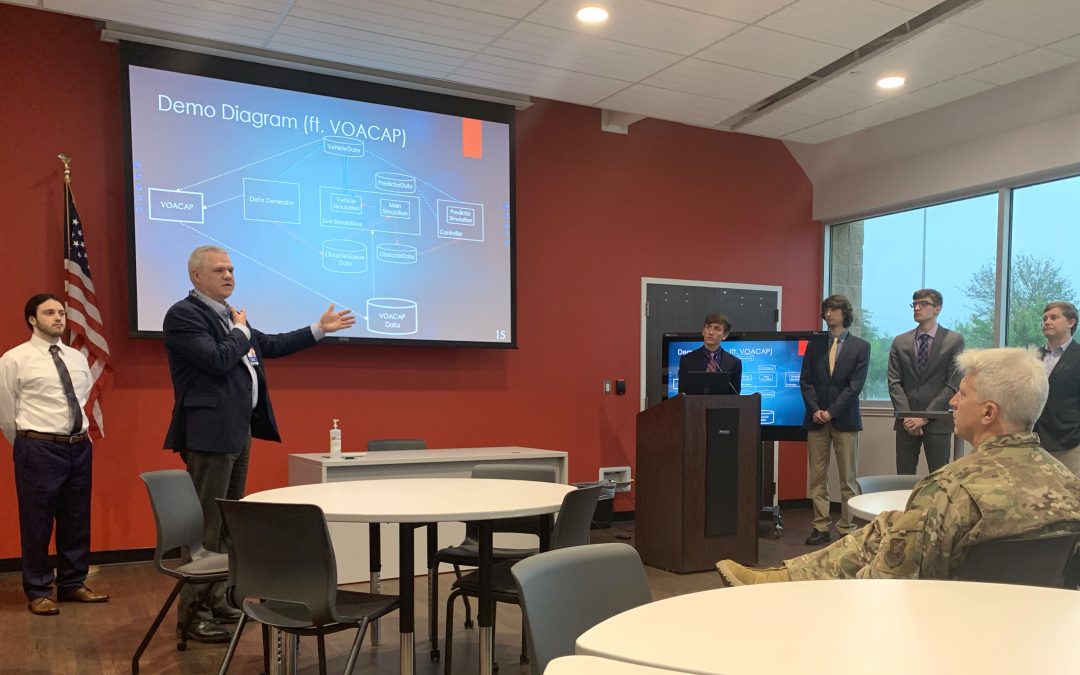Donald Copsey, AFGSC Fellows Project Champion, briefs command and Louisiana Tech University officials May 19, 2020 on capstone project results at the Louisiana Tech Academic Success Center in Bossier City, Louisiana. Managed by Louisiana Tech University, the Fellows Program is an AFGSC initiative to collaborate with academia, invest in developing innovative solutions to command challenges and foster future generations of students who aim to work for the Department of Defense. (Courtesy Photo by Sean Green)
By Keefer Patterson | Air Force Global Strike Command Public Affairs
BARKSDALE AIR FORCE BASE, La. — Students participating in Air Force Global Strike Command’s Pilot Fellows Program presented their final capstone projects to both command and Louisiana Tech University officials May 19 at the Louisiana Tech Academic Success Center in Bossier City, Louisiana.
The program, managed by Louisiana Tech, guided teams of students as they theorized and developed innovative solutions to command challenges. Partnering with the Cyber Innovation Center in Bossier City, Louisiana Tech saw fellows work full-time during the summer and part-time during the academic year to meet capstone objectives. Although the program’s first iteration is still ongoing and total hours are still being tallied, it is estimated that approximately 12,466 hours will be worked collectively between all 13 Fellows by the end of the program.
“The most fascinating thing about the Fellows program is that the students provide a new perspective that may identify capability gaps that weren’t seen before,” said Maj. Ryan Chapman, Air Force Global Strike Command Executive Chief Scientist. “Essentially, these students are thinking of creative ways we can reshape the way we do business in Global Strike.”
The fellowship program, established in June of 2020, consists of 13 fellows—seven graduate and six undergraduate Louisiana Tech University students, four professors and three AFGSC project champions supporting three focus areas in Nuclear Command, Control and Communication, Portfolio-Level Digital Engineering Platform and Knowledge Management.
“As project champions, we provide challenges,” said Donald Copsey, Nuclear Command, Control and Communication Center Model and Simulation Program Manager and AFGSC Fellows Project Champion. “The fellowship program provides the students the opportunity to discover solutions to those challenges. But it’s not just about getting a solution, it’s about getting a solution that’s going to be effective for the command.”
Some of the solutions and deliverables provided by the program have potential to provide foundational blocks for the future.
“Some of these solutions can be extremely practical in nature,” Copsey said. “Others are building block solutions, taking the first step, creating the foundational layer and then building upon it in the next year’s program.”
The fellowship program reinforces the command’s commitment to being innovative and collaborative, strengthening the relationship between academia and the Department of Defense. Furthermore, the program presents participating students the opportunity to gain real world experiences.
“It was a growing process for me,” said Michael Levesque, a student participating in the fellows program. “College gives you the knowledge and theory, but then you have to go to the real world. Being able to dive in, research and learn about something that is outside of my major was a really cool experience, but to also create a deliverable that benefits the command is very rewarding.”
Opportunities such as the AFGSC Fellows Program provide the command with new generations of potential hires with diverse technical skills and experience that can benefit the U.S. Air Force. If approved beyond its initial pilot, this program has the potential to further assist in fostering new ideas that will ultimately accelerate change.
“For this first year, I deem it as a huge success.” Copsey said. “We learned a lot!”


